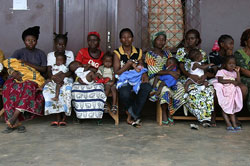
Top stories





Marketing & MediaWarner Bros. was “nice to have” but not at any price, says Netflix
Karabo Ledwaba 2 days

More news

Logistics & Transport
Maersk reroutes sailings around Africa amid Red Sea constraints


















An e-library for nutrition
The WHO e-Library of Evidence for Nutrition Actions (eLENA), launched during today's opening of a three-day Asia regional nutrition meeting in Sri Lanka, helps governments overcome one of the major challenges in fighting malnutrition: the vast, and often conflicting, array of evidence and advice that exists on effective, preventive and therapeutic nutrition interventions.
The online eLENA project does this by prioritising and presenting the latest advice on tackling the three main forms of malnutrition: undernutrition, vitamin and mineral deficiencies, and overweight and obesity.
"Several billion people are affected by one or more types of malnutrition," says Dr Ala Alwan, WHO Assistant Director-General of Noncommunicable Diseases and Mental Health. "Countries need access to the science and evidence-informed guidance to reduce the needless death and suffering associated with malnutrition. eLENA can greatly improve how countries cope with the terrible health threats posed by malnutrition."
Malnutrition can take several forms.
• Underweight is the leading risk factor for many diseases in low-income countries and represents about 6% of the global disease burden.
• Childhood underweight, micronutrient deficiencies (iron, vitamin A and zinc) and poor breastfeeding combined cause 7% of deaths (equivalent to 3.9 million lives lost) and 10% of the global disease burden.
• Micronutrient deficiencies include:
o iodine deficiency, which is the world's most prevalent, yet easily preventable, cause of brain damage;
o anaemia, which affects 1.6 billion people, mostly due to iron deficiency, and increases the risk of low-birth-weight babies and of pregnancy anaemia, associated with 18% of maternal deaths;
o vitamin A deficiency, which is suffered by 190 million preschool children;
o zinc deficiency, which can affect the immune system and kills 430 000 children annually; 1
• Overweight and obesity: around 1.5 billion adults over age 20 are overweight or obese. Global estimates suggest more than 40 million children aged under 5 are already overweight or obese.
eLENA describes the effective health interventions needed to tackle malnutrition. Such measures include the appropriate treatment of severe acute malnutrition; promoting breastfeeding; and fortifying staple foods with vitamins and minerals such as iron and folic acid for wheat and maize flours. It also recommends using multiple micronutrient powders to fortify foods for children aged between 6 and 23 months. To prevent anaemia, daily iron and folic supplements are advised for pregnant women, and intermittent iron and folic acid supplementation is recommended for menstruating women and preschool and school-age.
"To create eLENA, we have sifted through thousands of pages of scientific evidence and advice to prioritise, justify and better present the kinds of nutrition actions needed to prevent people succumbing to the many forms of malnutrition," says Dr Francesco Branca, WHO Director of Nutrition for Health and Development.
The new eLENA tool is an important component of WHO's global drive to help countries prevent and control malnutrition. WHO is a key driver of the "Scaling up Nutrition" movement, which involves multiple United Nations agencies and other key nutrition stakeholders. The movement's target is to help countries improve how they tackle malnutrition and ensure the response includes the agriculture, health, social protection and ensuring food security sectors.
eLENA is supported by the Bill & Melinda Gates Foundation, the US Centres for Disease Control and Prevention, the Canada-based Micronutrient Initiative and the Government of Luxembourg.
Source: WHO